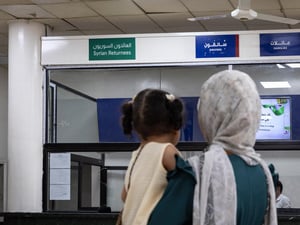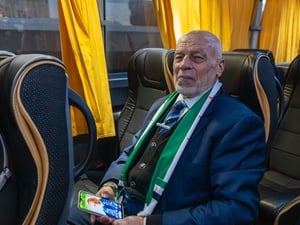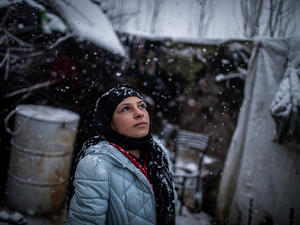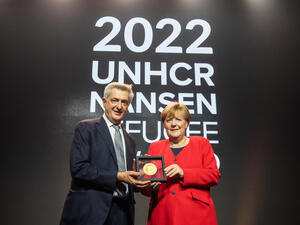Donors pledge more than US$7 billion to meet needs of displaced Syrians
Donors pledge more than US$7 billion to meet needs of displaced Syrians

UN High Commissioner for Refugees Filippo Grandi meets with Syrian refugees in Bhannine, in northern Lebanon, in March 2019.
BRUSSELS, Belgium – Delegates to a major EU and United Nations donor conference in Brussels today pledged more than US$7 billion in 2019 for the critical life-saving response inside Syrian as well as for support to refugees. The total set a new record.
The money will also help five neighbouring countries – Lebanon, Turkey, Jordan, Iraq and Egypt – that are hosting refugees. These pledges amount to nearly US$1 billion more than donors pledged in 2018.
In his concluding remarks, Under-Secretary-General and UN Emergency Relief Coordinator Mark Lowcock said: "I am very pleased with the outcome. We want to thank you for your generosity. Your support will help save millions of lives and protect civilians across Syria and the region."
Participants at the three-day meeting additionally announced multi-year pledges of US$2.37 billion for 2020-2021 and beyond.
More than 11 million people inside Syria need humanitarian aid and assistance is a lifeline to alleviate some of the worst effects of the conflict, said U.N. Secretary-General António Guterres.
“Another 5.6 million Syrians have fled to neighbouring countries, with no idea when they will be able to return home in safety and dignity. The United Nations and its partners are providing life-saving aid, including food, clean water, health care and protection assistance, to millions of people each month,” Guterres said in a video message to the conference on Tuesday.
Almost half of the people in need of assistance are children. Five million people are in areas of most acute need, while millions more are internally displaced. Of them, 1.1 million people are in areas categorized as hard to reach. The UN High Commissioner for Refugees, Filippo Grandi, visited Syria and Lebanon last week to get a sense of the scale of the need.
“I was struck – and humbled – by the extraordinary resilience of people who have lived through experiences almost beyond contemplation; and yet, are determined to rebuild their lives and their communities,” Grandi told the conference on Thursday, in the wake of his visit to Damascus, Homs and rural Hama.
He also noted that many Syrians are returning home, even amid grave destruction, areas of remaining insecurity and lack of basic essentials, including water, food, medicine and jobs. Humanitarian and other agencies are doing what they can, but the needs will increase as large numbers of internally displaced people, and some refugees, return.
“Returns will continue and increase. In the meantime, that support to neighbouring countries must be renewed, so that they can sustain that hospitality until it is necessary,” Grandi said.
Grandi spelled out three priorities for future assistance. First, he called for renewed and more predictable support for neighbouring host countries. Second, he said there should be more resettlement places for refugees as well as complementary pathways such as scholarships and training schemes.
Resettlement is key to responsibility sharing but the number of places has plummeted in the last two years, with just one in 200 refugees resettled annually. Finally, he called for refugees and the internally displaced at the centre of preparations for return, given that most Syrian refugees see their future back home.
“Syria remains one of the great crises of our time,” Lowcock said. “Syrians many of us listened to as part of this conference’s Days of Dialogue left a single stark message ringing in our ears: they want to live in safety.”








